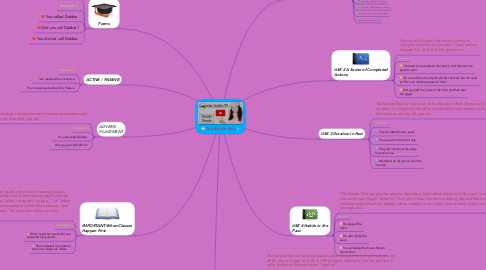The Simple Past
by Ingrid A. Samaritano

1. Forms
1.1. [VERB+ed] or irregular verbs
1.2. Examples:
1.3. You called Debbie.
1.4. Did you call Debbie?
1.5. You did not call Debbie.
2. USE 5 Past Facts or Generalizations
2.1. The Simple Past can also be used to describe past facts or generalizations which are no longer true. As in USE 4 above, this use of the Simple Past is quite similar to the expression "used to."
2.2. Examples:
2.3. She was shy as a child, but now she is very outgoing.
2.4. He didn't like tomatoes before.
2.5. Did you live in Texas when you were a kid?
2.6. People paid much more to make cell phone calls in the past.
3. ACTIVE / PASSIVE
3.1. Examples:
3.2. Tom repaired the car. Active
3.3. The car was repaired by Tom. Passive
4. IMPORTANT When-Clauses Happen First
4.1. Clauses are groups of words which have meaning but are often not complete sentences. Some clauses begin with the word "when" such as "when I dropped my pen..." or "when class began..." These clauses are called when-clauses, and they are very important. The examples below contain when-clauses.
4.2. Examples:
4.3. When I paid her one dollar, she answered my question.
4.4. She answered my question when I paid her one dollar.
5. ADVERB PLACEMENT
5.1. The examples below show the placement for grammar adverbs such as: always, only, never, ever, still, just, etc.
5.2. Examples:
5.3. You just called Debbie.
5.4. Did you just call Debbie?
6. USE 2 A Series of Completed Actions
6.1. We use the Simple Past to list a series of completed actions in the past. These actions happen 1st, 2nd, 3rd, 4th, and so on.
6.2. Examples:
6.3. I finished work, walked to the beach, and found a nice place to swim.
6.4. He arrived from the airport at 8:00, checked into the hotel at 9:00, and met the others at 10:00.
6.5. Did you add flour, pour in the milk, and then add the eggs?
7. USE 3 Duration in Past
7.1. The Simple Past can be used with a duration which starts and stops in the past. A duration is a longer action often indicated by expressions such as: for two years, for five minutes, all day, all year, etc.
7.2. Examples:
7.3. I lived in Brazil for two years.
7.4. They sat at the beach all day.
7.5. They did not stay at the party the entire time.
7.6. We talked on the phone for thirty minutes.
8. USE 4 Habits in the Past
8.1. The Simple Past can also be used to describe a habit which stopped in the past. It can have the same meaning as "used to." To make it clear that we are talking about a habit, we often add expressions such as: always, often, usually, never, when I was a child, when I was younger, etc.
8.2. Examples:
8.3. He played the violin.
8.4. He didn't play the piano.
8.5. She worked at the movie theater after school.
9. USE 1 Completed Action in the Past
9.1. Use the Simple Past to express the idea that an action started and finished at a specific time in the past. Sometimes, the speakr may not actually mention the specific time, but they do have one specific time in mind.
9.2. Examples:
9.3. I didn't see a play yesterday.
9.4. Last year, I traveled to Japan.
9.5. Last year, I didn't travel to Korea.
9.6. Did you have dinner last night?
9.7. He didn't wash his car.


